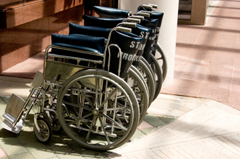Discharge should always be the goal when it comes to in-patient care. Furthermore, it should never come as a surprise when a physician tells the patient those 5 magical words: you’re ready to go home.
When a patient is told by their physician that they’re being discharged, that’s the only thing on their mind. Internally, we know that there’s much to be done from the time the physician gives the orders and the time when the patient actually leaves.
From paperwork to education, the clock is ticking, and the patient’s discharge experience might even ruin an otherwise pleasant hospital stay. With that said, it’s important to adjust your workflow and work with doctors to anticipate and prepare to make the discharge process a smooth experience.
Anticipate the date and time of discharge through a discharge planning process.
Depending on the patient’s condition and rate of recovery, anticipating a discharge date is generally possible. Especially when you are working and communicating closely with the patient’s physician. In your discharge planning process, anticipate and document the discharge date and time. If you don’t have such a process in place, then that’s a whole different matter – and one that should be addressed.
Educate the patient in advance of the magical 5 words.
When you are able to anticipate discharge, you can begin to prepare the patient via education beforehand. This is especially important for patients who have never been admitted to a hospital or are not familiar with your hospital’s procedure.
Take some time before the patient is discharged to let them know how the process will work and what they can expect. This will also help them mentally prepare to coordinate travel arrangements and think of any questions they might have. Setting the stage for the things that will need to be done ‘after’ the doctor prepares the discharge orders, will help lesion the impact of the delays.
Begin paperwork beforehand.
As the discharge date/time looms, you should begin preparing patient files in advance. This means patient education, filling out basic forms with information you have, med reconciliations, etc.
We all know this takes time, so being prepared will help reduce the time patients spend waiting to leave and can help create an even better in-hospital experience. What better way to leave your facility than on a high note.
As I previously mentioned, discharge is seldom a complete surprise. In fact, it should always be a goal. Good physician relationships will enhance your discharge planning process by having them provide your team with appropriate information regarding the patient status for going home.





